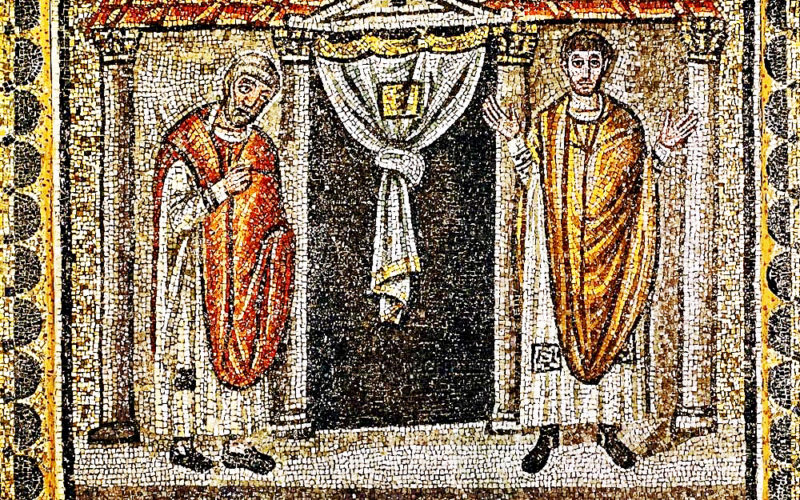‘If you’re not a sinner, there’s no place for you in the Catholic Church’
Pic: The Pharisee and the Publican – mosaic, Basilica di Sant’Apollinare Nuovo, Ravenna, Italy, 6th c.

God’s Word in Everyday Living
Marc Cardaronella
This week’s Gospel, Luke 18:9-14, highlights the importance of humility. It’s the Parable of the Pharisee and the Tax Collector. The spiritual masters often call humility the foundation of the Christian life. It’s the fundamental attitude for approaching God. 1 Peter 5:5 says, “Clothe yourselves, all of you, with humility toward one another, for ‘God opposes the proud, but gives grace to the humble.’” The parable this week illustrates that very point. So why is humility so vital and what does it look like? That’s what we’re here to find out.
Who were the Pharisees? Pharisees dedicated themselves to interpreting the Mosaic Law, living according to it, and making sure others did, as well. Throughout Israel’s history, big problems came from people being unfaithful to God’s commands and failing to follow the Law. The Pharisees were all about setting that right, which is not a bad intention. They just approached it wrong. For the Pharisees, Israel could only remain faithful to the Law by being separated from the Gentiles who lived all around them. Their name even means “the separated ones.” Separation and Jewish national identity came through cultural symbols like circumcision, keeping the Sabbath, observing the laws surrounding food, and giving tithes. These rituals and precepts set Israelites apart. They were signs of Israel’s status as God’s chosen people. However, the Pharisees were so caught up in the exactness of external observances, they missed the real meaning of the Law—justice and mercy. From the outside, they looked perfect and followed the Law in trivial detail. But on the inside this perfection led to sinful pride, resentment, and disdain. Their zeal for God’s Law led them to sin…and to missing their own salvation.
Now, it’s easy to judge the Pharisees, but it doesn’t take much to fall into this trap. Have you ever seen someone that looked out of place at Mass and thought, “What are you doing here?” Maybe they aren’t dressed well, or they don’t seem to know what they’re doing. Perhaps they talk during the consecration, look at their phone, or act distracted.
When I was a parish Director of Religious Education, one of my jobs was preparing parents for their child’s baptism. Most of the time, parents were coming to us before the birth so they could baptize the child right away. That’s the way you’re supposed to do it, right? Every Catholic knows you baptize your baby after a few weeks…a month at the most. But sometimes we encountered people who weren’t on the right “timeline.” They had waited a few years (maybe even 8 or 10). There were many different reasons, but usually they just got busy with life and stopped attending church. The point is, they were outside the norm. Some baptismal prep catechists had a hard time welcoming these “irregulars.” They wanted to shake them and say, “What are you thinking? Why did you wait so long? Why haven’t you been living the perfect Catholic life? You need to do that before we can baptize your child!” But the Church sees Infant Baptism as a special time of conversion, and baptismal prep as a time to welcome the lost, even if they are irregular.
Anyone can develop this attitude. There’s a tendency to view the Church as a club for those who have arrived. The people who belong are the ones who do all the right things. They go to Mass every Sunday. They say their prayers. They tithe. They baptize their babies a few weeks after birth. But really, it’s a hospital for the spiritually sick. Who belongs there? Only sinners. If you’re not a sinner, there’s no place for you in the Catholic Church.
So, when the Pharisee goes to the Temple to pray he says (and I’m paraphrasing), “Thank you, God, for making me who I am, a righteous man who follows your every law, and not a dirty sinner like that tax collector” (ooh, fail). Why is that wrong? In verse 9, it says the Pharisee relies on himself for his salvation. He’s thanking God but really, he’s just boasting about his own greatness. He’s prideful and that pride leads him to look down on everyone else. Since he doesn’t need any help from God (he’s got this holiness thing wired) he remains in sin…unforgiven and unjustified.
The tax collector says, “God, be merciful to me a sinner” (Luke 18:13). This is the right attitude in prayer. Why? Because we’re all sinners and right off the bat he acknowledges this. Not one of us has it ALL together! And, we must recognize this when we come before God or he can’t work with us. The tax collector acknowledges his spiritual sickness and need for God’s help and healing. He knows he can’t save himself and so he relies on God.
Catechism 2559 says, “But when we pray, do we speak from the height of our pride and will, or ‘out of the depths’ of a humble and contrite heart? He who humbles himself will be exalted; humility is the foundation of prayer.” Humility is acknowledging you are broken and need God’s help to be whole. It’s the willingness to let go of what you know and take on the mind of God. It’s the recognition that you can’t save yourself and must rely on him. Empty yourself and be open to receiving God’s mercy. Rely on the grace of the Holy Spirit instead of relying on your own superior ability to have it all together. Allow yourself to be led by God and watch your life change for the better.
Marc Cardaronella is the Director of the Office of Catechesis and Faith Formation.





